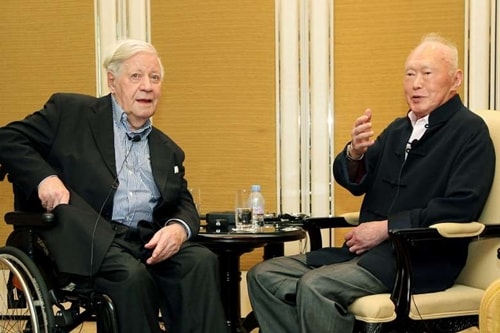Lee Kuan Yew's prediction of the EU's dark future
In a 2012 interview, the late Singaporean Prime Minister Lee Kuan Yew commented that the European Union (EU) expanded too quickly, and could fail.
 |
Former Singapore Prime Minister Lee Kuan Yew (right) in a meeting with former West German Chancellor Helmut Schmidt in 2012. Both men are now deceased. Photo: Strait Times |
Since late 2009, when the sovereign debt crisis began to spread in Europe, Mr. Lee Kuan Yew has been asked many times to share his views on the situation in this continent. And since then, he has had very thorough and worrying views, according to Straits Times.
In September 2011, the former leader of Singapore predicted the collapse of the euro in a conversation, saying it would be “painful work”, but that a Europe with all members equal was too difficult. At that time, the European debt crisis was entering its second year.
In a talk at the Lee Kuan Yew School of Public Policy, he said European leaders would do their utmost to avoid the collapse of the euro, as that would be "an admission that their ideal of a united Europe is unattainable".
"I don't believe they will save it. However, they will try and are continuing to try," he added.
When asked by an audience member whether Singapore would buy bonds from debt-ridden European countries, Mr Lee asserted that Singapore's gross domestic product (GDP) was only a fraction of the EU's, and therefore "it cannot save Europe, and I don't think buying their bonds will save them".
The veteran leader also said the common currency of the 17 EU countries was the problem. "The fundamental problem with the euro is that it makes everyone, every European country, move at the same pace, whereas each country has its own rhythm and you cannot expect the Greeks to move at the same pace as the Germans. So this problem will not be solved."
"Eventually, I don't know when, but there will have to be a recognition that the ideal is out of reach. A Europe divided into two or even three groups is achievable, but a unified Europe with different spending, saving and regulatory habits is too difficult," Mr. Lee added.
The euro was introduced in 1999 with the hope of increasing economic cooperation and growth in Europe, while enhancing the EU's international standing. However, as many countries in the eurozone faced debt crises, the common currency union was criticized for forcing other European countries to bail out members in crisis. In addition, the EU deprived policymakers of the flexibility to use monetary policy - a tool to prevent recession.
Mr. Li also said he did not believe China would be interested in “rescuing Europe for the sole purpose of helping Europe. They are only interested in buying cheap European bonds and hoping to make a big profit.” Media at the time estimated that about a quarter of China’s foreign exchange reserves could be in euros.
In May 2012, when Mr. Lee met his old friend, former West German Chancellor Helmut Schmidt, both were interviewed by the German newspaper Die Zeit. At that time, Mr. Lee was 89 years old and Mr. Schmidt was 93.
In response to a reporter's question about whether the EU model is an inspiration for the world, as the continent has united after witnessing two World Wars, Mr. Ly gave a surprising answer:
"No, I don't see the EU as an inspiration for the world. I see it as a misguided enterprise because it's expanding too fast and it could fail," the former Singapore leader said.
When asked by reporters if that meant Asia could not learn anything from European integration, Mr. Lee said that it was certain that unification could not be achieved that way.
"But what we can draw from is a growing awareness of common interests, which are free trade areas, and from there we can develop it step by step. The problem in Asia is the overwhelming position of China," he said.
"Is free trade all that can be achieved in Asia?" the Zeit reporter continued to ask. Mr. Lee replied that "free trade and a sense of belonging; we are not at war with each other. We resolve our differences, that is a fact. We meet regularly, we do not threaten each other."
In his book "Lee Kuan Yew: A World View" published in 2013, Mr. Lee also spent a lot of time discussing the future of Europe.
"Over the past two or three years, European leaders, including David Cameron, Nicolas Sarkozy and Angela Merkel, have separately declared that the philosophy of multiculturalism has failed in their countries. In other words, Turks settling in Germany do not become Germans, nor Algerians and Tunisians in France do not become French. Race is at the root of this inability to assimilate, although religious, cultural and linguistic factors are also relevant factors," reads a passage in the book.
"But Europe cannot stop the flow of migrants because they are the ones meeting the region's growing needs. So we can see that European governments will let migrants in as long as they can, and will only stop when elections come and right-wing parties overwhelm their moderate opponents with angry statements," Mr. Lee Kuan Yew wrote.
"Unification holds great promise, not just for peace. A Europe that achieves unity of purpose will create a greater economic power and, more importantly, a greater voice in international affairs. Look at America. They are essentially Europeans who have been transported to another continent and have abandoned their racial loyalties and their different languages. If Europe also achieves that level of unification, and becomes the United States of Europe, there is nothing the Americans can do that the Europeans cannot."
"Yet all signs suggest that unification is impossible. They have so far failed to create an effective common currency, and are unlikely to achieve a single foreign policy or a single military," he asserts in the book.
"Every country has its own history, stretching back centuries. Every country is proud of its traditions. Above all, they want to preserve their language – behind it lies the glory and literature. America has decided to open a completely new beginning, to create a new literature, but Europe will not be able to do that. Even though English is now the second language in every other country, the countries of the European continent will never accept it as the only official language," he wrote.
From that perspective, Mr. Lee Kuan Yew believed that Europe's position in the international arena would gradually weaken compared to the major powers.
"In the face of the dominance of other major powers such as the US, China and, possibly, India, Europe will be reduced to a supporting role. Most European countries will be treated as mere small states. Germany can continue to shoulder the burden alone, thanks to its population size and economic success. The British will retain some influence thanks to their special transatlantic relationship with the US.
But on the other hand, Europe cannot hope to have a weighty voice at the negotiating table alongside the US, China and India, even though some European leaders may be reluctant to admit it.
After all, we are comparing countries of 40, 50 or 80 million people with China of 1.3 billion or India of 1.2 billion. The Chinese, in particular, will find a divided Europe easier to deal with. They can deal with each country individually rather than as a group. Each European country will depend on China more than China depends on it. This will become even more evident as China's economy shifts to domestic consumption-led growth," Lee wrote.
According to VNE








